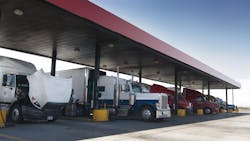I heard some rumblings at the recent Technology & Maintenance Council’s spring meeting that some people think NACFE is moving too quickly in its work on battery-electric vehicles and ignoring diesel-powered trucks. That simply is not true. While we believe that ultimately electric vehicles, both battery and hydrogen fuel cell ones, will be the cleanest path to a zero-emissions future, we know that for the next several decades, we will see trucks powered by a variety of fuels—including diesel.
That is one of the major points of our recently released thought leadership report, The Messy Middle: A Time For Action. Today fleets face a variety of powertrain options—one of which is the traditional diesel.
NACFE’s mission is to help fleets improve their freight efficiency. Today that means advocating for efficiency regardless of the energy source that powers the truck. But I want to get back to diesel. Our Annual Fleet Fuel Study reported that the national average fuel economy of all US Class 8 tractor-trailers was 6.24 MPG in 2020 but the fleet-wide average for the fleets that participated in the study was 7.24 MPG. That is a significant difference. And way back in 2017, the seven fleets that participated in the first Run on Less averaged 10.1 MPG.
If you follow any of the drivers who are committed to freight efficiency—Joel Morrow, Clark Reed, and Henry Albert, to name a few—you’ll see that they are routinely around 10 MPG. It begs the question, why is the national average 6.24 MPG?
See also: Fueling future fleets is just another problem trucking can solve
I point all this out because it is clear to me that there is more that fleets can be doing to improve the efficiency of their diesel-powered vehicles. And improving MPG is part of decarbonizing trucking. It is simple: getting more miles from a gallon of diesel fuel means you burn less fuel overall, and less fuel burned means fewer emissions.
NACFE is going to continue to encourage fleets to invest in technologies like low-rolling resistance tires, aerodynamic devices on both tractors and trailers, and tire pressure monitoring, and to implement practices around optimizing electronic engine parameters, optimizing routing, reducing speed, and eliminating empty backhauls.
A combination of regulations and an increased focus by many companies to move toward more sustainable business practices is putting pressure on the trucking industry to be cleaner.
NACFE’s job is to help the industry do just that, and we will do it across a range of powertrain options. We have not abandoned our goal of making diesel-powered trucks more efficient. But we have expanded our reach to try to help the whole industry move to a zero-emissions future while recognizing that fleets will have many paths to get there, and that diesel is an option that will be viable for the next several decades. We’re happy to talk to any fleet about their options and others on how they support fleets, for increasing efficiency in the current messy middle of trucking.
Michael Roeth has worked in the commercial vehicle industry for nearly 30 years, most recently as executive director of the North American Council for Freight Efficiency (NACFE). He serves on the second National Academy of Sciences Committee on Technologies and Approaches for Reducing the Fuel Consumption of Medium and Heavy-Duty Vehicles and has held various positions in engineering, quality, sales, and plant management with Navistar and Behr/Cummins.
About the Author

Michael Roeth
Executive Director
Michael Roeth is the executive director of the North American Council for Freight Efficiency. He serves on the second National Academy of Sciences Committee on Technologies and Approaches for Reducing the Fuel Consumption of Medium and Heavy-Duty Vehicles and has held various positions with Navistar and Behr/Cummins.
